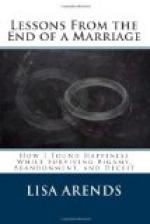The way out of the Family Jar is often labyrinthine; but the Loving Individual can always thread it.
CHAPTER XIII.
THE TRUTH ABOUT DIVORCE.
In January Psychic and Occult Views and Reviews the editor, M.T.C. Wing, presents a view of “Wives and Work” which is anything but an occult view of the subject. He evidently still clings to the old notion that man was made for the family, and not the family for man. He inveighs against George D. Herron and Elbert Hubbard et al because they permitted themselves to be separated from their wives. Apparently he thinks the chief end of man is to tote some woman around on a chip, and the fact that in his callow youth man picked out (or was picked out by) the wrong woman, cuts no figure in the matter. Man must keep on toting her even if he has to give up his life work by which he has been enabled to supply the chip, not to mention the other things the woman demands.
All of which is the very superficial view of the world at large, and has no place among new thought, “occult” teachings. It is entirely too obvious—to the old-fashioned sentimentalist, who is blind to the real facts in cases of separation.
The sentimentalist gets just two views of the family, and draws his hasty conclusions therefrom. He sees first a happy family, a charming, clinging little simpleton of a wife, with half a dozen or so infants clinging to her skirts and bosom, and her round eyes lifted in adorable helplessness to the face of that great, strong lord and master, her husband. In his second view of the family he beholds this strong man turn his back upon this adoring family and walk deliberately forth to self-gratification, leaving them to perish from hunger and grief. Fired with these pretty and entirely fanciful pictures the superficial observer burns with indignation and calls down anathema upon the head of the deserter.
The fact is that no man ever deserts a family under such conditions. There is always a long period of disintegration before any family goes to pieces—a period of which both man and wife are well aware. When a separation comes it is really a relief to both parties. The only real pain in such cases comes from the spirit of revenge, or a desire on the part of one or the other to pose as injured innocence, that she or he may rake in the sympathy and fire the indignation of just such uninformed friends as M.T.C. Wing.
I have known a lot of people who separated—known them intimately and observed them well. In not one of these cases did the deserted party claim to love the deserter. In all there was a real relief when it was all over. In every case the one thing which had held them together so long was fear of disgrace. “Oh, what will people think of me?”—is the first cry of everybody—especially women. It was that which made the deserted one unhappy and resentful. It is that which makes many women pose as injured innocents and rate the deserter as a villain. And all the time in secret they are glad, glad that they are relieved of the burden of living with an uncongenial husband or wife.




